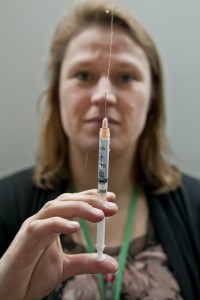Flu season far from over

The Hastings and Prince Edward Counties Health Unit offers flu shots year-round at their regular immunization clinics, according to communicable disease program manager Stephanie McFaul, pictured. Photo by Jessica Corriveau
By Jessica Corriveau
The annual flu shot clinics are over, but with winter finally making an appearance, the flu season is far from done.
So far this year, there has only been one lab-confirmed case of influenza in a local resident. It was not considered severe.
The Hastings and Prince Edward Counties Health Unit offered dedicated flu shot clinics from October through December, and administered approximately 6,598 doses of this year’s vaccine. The trivalent formula is based on predictions on what three strains of influenza makers of the vaccine believe will spread. Targeting two types of influenza A and one type of influenza B, it has been fairly accurate and the strains reported across the country so far this year have mostly matched what strains were used in the vaccine, according to Stephanie McFaul, communicable disease program manager at the health unit.
“Getting the flu shot is the number one preventative,” says McFaul. “While there are no tell-tale signs, if you’re running a fever, feel very unwell or if you have no energy, are coughing and sneezing and spreading the flu, you should stay home and get some rest.”
The Ministry of Health and Long-Term Care offers a flu self-assessment tool on its website to help decide when to seek medical care.
After the dedicated clinics are over, the vaccine from the health unit is available at the regular year-round immunization clinics, along with a variety of vaccines also offered, according to Carol Snell, spokesperson for the health unit. Residents can also get flu shots from their doctors, schools and some workplaces, which are supplied through a program run by the health unit.
Loyalist College’s health services held several flu shot clinics before Christmas, with a good turnout. Students and staff turned out to get their yearly vaccine against the potentially deadly influenza virus, an illness many confuse with the less severe common cold and respiratory infections.
In the new year, while the college no longer has dedicated clinics, students and staff who missed them can come in to health services at any time with their health card to get their flu shot.
“There are programs in the college where students are required to have their flu shot. If they’re going into a nursing home or out into the community, the agencies want them to have had their flu shot before they start placement,” said Lauren Deans, the college’s registered nurse.
After the H1N1 outbreak, the college installed hand sanitizing stations. Placed in strategic high traffic points around the school, these hand-sanitizer solution dispensers help staff and students keep up with regular hand-washing to help prevent an influenza outbreak.
Deans also had some tips for students in residence should someone close to them get sick.
“It’s the same stuff you would do at home. Wash your hands often, wash your dishes separately, and don’t wash them all together. Clean the bathroom more often; wipe doorknobs and handles.”
The Quinte Naturopathic Centre offers an all-natural alternative to the vaccines.
“We use something called pascoleucyn, by a company called Pascoe Canada. It’s administered by either drops diluted in water, or a shot,” said Jessica Ruttan, at the centre.
Pascoleucyn, made of the plants boneset and baptisia (blue wild indigo), a type of coniferous tree known as thuja, echinacea, and the venom of the bushmaster snake, is used both as a preventative and a treatment. It is non-prescription and registered with Health Canada, according to Pascoe.
 Print This Post
Print This Post






